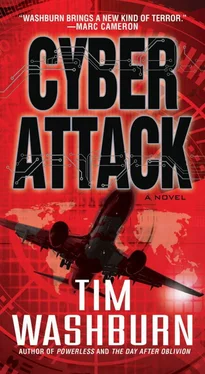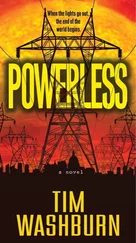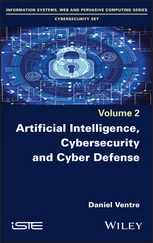Tim Washburn - Cyber Attack
Здесь есть возможность читать онлайн «Tim Washburn - Cyber Attack» весь текст электронной книги совершенно бесплатно (целиком полную версию без сокращений). В некоторых случаях можно слушать аудио, скачать через торрент в формате fb2 и присутствует краткое содержание. Город: New York, Год выпуска: 2018, ISBN: 2018, Издательство: Pinnacle Books, Жанр: Триллер, на английском языке. Описание произведения, (предисловие) а так же отзывы посетителей доступны на портале библиотеки ЛибКат.
- Название:Cyber Attack
- Автор:
- Издательство:Pinnacle Books
- Жанр:
- Год:2018
- Город:New York
- ISBN:978-0-7860-4253-1
- Рейтинг книги:5 / 5. Голосов: 1
-
Избранное:Добавить в избранное
- Отзывы:
-
Ваша оценка:
- 100
- 1
- 2
- 3
- 4
- 5
Cyber Attack: краткое содержание, описание и аннотация
Предлагаем к чтению аннотацию, описание, краткое содержание или предисловие (зависит от того, что написал сам автор книги «Cyber Attack»). Если вы не нашли необходимую информацию о книге — напишите в комментариях, мы постараемся отыскать её.
Cyber Attack — читать онлайн бесплатно полную книгу (весь текст) целиком
Ниже представлен текст книги, разбитый по страницам. Система сохранения места последней прочитанной страницы, позволяет с удобством читать онлайн бесплатно книгу «Cyber Attack», без необходимости каждый раз заново искать на чём Вы остановились. Поставьте закладку, и сможете в любой момент перейти на страницу, на которой закончили чтение.
Интервал:
Закладка:
Hassan types out a response: Hurry!
CHAPTER 64
Little Rock, Arkansas
While Paige and Hank wing their way to the airport, the employees of Heartland Energy in Little Rock, Arkansas, are hard at work. Nestled in the pine trees west of Little Rock is an unassuming low-slung building that is set back from the main road and hidden behind a mass of large-scale commercial stores. The only thing that differentiates this building from others in the area is the number of exterior cameras and the razor wire that encircles the property. It’s not a difficult place to find, if you know what you’re looking for—but good luck getting inside. In addition to the razor wire, there are a multitude of other external security features to prevent and repel possible threats from terrorists looking to do the country harm.
But the security doesn’t end there. Inside, the company’s computer networks have all the necessary firewalls, the redundant systems, and the people who know how to operate such networks. In fact, the facility operates much like other businesses with one exception—18 million people depend on the second-by-second decisions made by the employees working inside the average-looking building.
Heartland Energy plays a role in managing the largest machine ever built by humans—the power grid. Heartland oversees the flow of electricity to homes and businesses in all or part of fourteen states, serving 18 million customers. It’s a highly automated process that’s managed from the state-of-the-art control room that looks more like a NASA rocket launch facility, with a wall of large video screens displaying weather, news, and the current status of the grid. With 790 member power plants, 65,000 miles of transmission lines that stretch from West Texas to the Dakotas, it’s a massive job just to keep it all up and running the way it was designed to do every day, 365 days a year. Heartland harnesses the power from multiple utilities and independent power producers and feeds that power out to the grid. It’s a hodgepodge of different entities, both public and private, with each usually having to conform to a different set of rules depending on jurisdiction, making the task that much more complicated. To help, a network of computers performs a majority of the control center’s tasks, but humans are involved, too. One of those humans is night shift supervisor Jackie Gentry.
At twenty-eight, Jackie’s attention to detail and her dogged determination led to a promotion to supervisor, surpassing many long-term employees who still harbor resentment. Jackie could care less what the old-timers think—her ultimate goal is to someday run the company. She’s not rude or mean—in fact, she goes out of her way to include everyone whenever decisions are made—but some people aren’t happy no matter what you do. And, for Jackie, that’s fine—just do your damn job.
Tall at five-ten, Jackie grew up in northern Minnesota, where the harsh winters sometimes had an effect on the power grid and she knows that a power outage can have disastrous consequences, even loss of life. With long, wheat-colored hair, blue eyes, and a slender build, Jackie has many of the traits of her Nordic ancestors. Tonight, her hair is gathered into a high ponytail as she takes a seat at her workstation. Inside the control room, as many as twenty people are working to monitor voltages, line outputs and inputs, power plant status, electricity demand, and, of course, a second-by-second look at wholesale energy prices. After all, Heartland Energy is a business and the number one goal is profits, with performance and customer service tied at a distant second. Millions of dollars are made every day by buying and selling electricity either through other companies or by purchasing futures and options on the open market. Jackie understands all of this, but her primary objective is to keep the lights on, regardless of the circumstances.
Using her computer, Jackie dims the room’s lights a bit more and gets on with her daily tasks. Summer is peak demand for electricity, and August often ends up being the winner most years as temps across the region soar past 100 degrees most days. Even the nights are hot, rarely dipping below 80 in most places, and all those energy-gobbling air conditioners cutting on and off put a tremendous strain on the power grid. This time of the year, Jackie likes to keep a close eye on the power plants. They had received the urgent messages about the other power outages, but there’s little they can do but focus on keeping the lights on for their customers. During most months of the year the power plants operate below peak capacity—not so during the summer months. Most every plant is churning and burning and, coupled with light winds that often idle the big wind farms during the hottest months, it’s a tightly choreographed dance to keep the grid running.
The folks at Heartland Energy take their jobs seriously. To ensure the power continues unabated they built an exact replica of this facility on the other side of the Arkansas River. There, the crew and computer systems mimic everything Jackie and her staff do and are capable of taking over power grid operations at a moment’s notice.
Jackie opens the program that monitors the plants and pages through the real-time results that show capacity, power generated, and current status. All looks normal until she lands on a natural gas–fired plant in the Nebraska Public Power District. She glances up from her screen and scans the room, looking for one of the engineers. She spots Isaac Armstrong and calls him over. “Have you seen the turbine speeds at the Early Power Plant in Fremont?”
Isaac pulls up a chair and sits. “They’re fluctuating a little, but it hasn’t triggered an alarm.”
“Yet,” Jackie says. “They’re really ramping up. I bet we’ll get an alarm—” Her last words are drowned out by an audible alarm as one of the video screens flashes red.
“There you go, Isaac. Find out what the problem is, please.”
Isaac gives her a mock salute and returns to his workstation. Now Jackie has to find a way to reroute power while maintaining consistent voltages and frequencies. She scans through the list of power producers, trying to find one or two who aren’t operating at capacity. “Damn it,” she mutters. It doesn’t help that the few nuclear facilities she has access to were ordered off-line earlier in the day after the disaster at Calvert Cliffs.
Another alarm sounds and more screens flash red. Turbine speeds at eight more power-generating plants are redlining. If she takes them off-line all at once, it could lead to a precipitous drop in voltage, which would trigger automatic shutdowns all across the region. She begins removing the troubled plants from the grid one at a time and replaces them with spinning standbys—power plants that are up and running but not sending power to the grid. The one major problem that all power grid managers have to deal with is the fact that there is no energy storage to draw from. If you want power then you have to get it from a power-producing plant at the exact moment you need it. By the time Jackie is finished replacing the troubled plants, she’s out of spinning standbys and all available plants are now operating at max capacity to pump out power during one of the day’s highest peaks for demand as people enjoy dinner and rest comfortably in their nice, cool homes.
Jackie swivels her chair around, searching. “John,” she shouts across the room to her coworker, “call the other interconnects to see if we can buy some additional capacity.”
John waves to let her know he heard her and picks up the phone.
“No, no, no,” Jackie mutters as turbine speeds at other plants ramp up. “What the hell is going on?” she mumbles as a cascade of alarms sound around the room. The current status of the grid is displayed on a very large screen hanging on the front wall and Jackie looks on in horror as several grid segments flash from green to red. Red is the one color that makes a grid controller’s blood run cold and it feels as if ice is running through Jackie’s veins as she watches the avalanche of power failures continue. Within seconds the entire map turns red and 18 million people are left in the dark.
Читать дальшеИнтервал:
Закладка:
Похожие книги на «Cyber Attack»
Представляем Вашему вниманию похожие книги на «Cyber Attack» списком для выбора. Мы отобрали схожую по названию и смыслу литературу в надежде предоставить читателям больше вариантов отыскать новые, интересные, ещё непрочитанные произведения.
Обсуждение, отзывы о книге «Cyber Attack» и просто собственные мнения читателей. Оставьте ваши комментарии, напишите, что Вы думаете о произведении, его смысле или главных героях. Укажите что конкретно понравилось, а что нет, и почему Вы так считаете.












